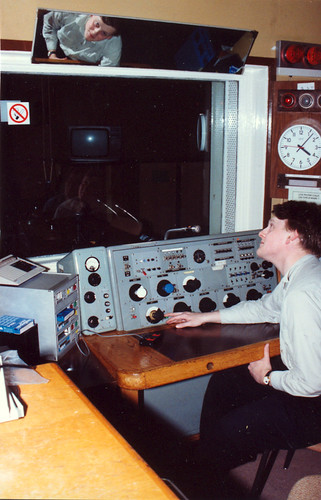Human Voices by Penelope Fitzgerald (1980). 4th Estate Books, £8.99
It’s hard not think that I was destined to read, and indeed love, this book. Andy Miller recommended it to me saying he thought it would be right up my street – what with with my fondness for women writers and having worked myself for many years as a sound engineer in BBC radio, how could I not love this novel set in Broadcasting House (BH) in World War II with a finely-described view of the corporation’s jargon, technical details and beautifully humorous and observed human frailties? He tweeted a page in which two characters return from an absurd field trip recording sound effects of church doors with hours of material: ‘the quality’s superb, particularly on the last fifty-three bands or so’…
‘The engineer who had gone with them said nothing. He went straight away to have a drink.’
Just as I started reading the book for myself, something in Hermione Lee’s introduction seemed oddly familiar. Penelope Fitzgerald had lived in poverty on a boat on the Thames. This rang a bell. I quickly googled her life and a conversation I had some two years ago came back to me: she had taught English at the same girls’ school in South Kensington where I taught for two years recently. A Computer Science teacher, I was an interloper in the tiny, cramped English department office and it was the then head of English at Queen’s Gate, Jim Denchfield, who had recommended Penelope Fitzgerald to me. (I liked to think that my English degree allowed me passage into their world, and indeed I loved listening to them discussing books and the pupils’ responses to them. I did not envy them their marking, however.)
Fitzgerald’s name had fallen out of my head instantly (yes, you at the back there, nominal aphasia bugged me my entire teaching career until I decided not to worry about it any more) but I carried with me the idea that I had taught at the same school as a somewhat eccentric and neglected novelist, albeit one, I now realise, who won the Booker Prize.
A Queen’s Gate pupil remembers “her mild high voice often straying off into silence, and with a surprisingly sweet, warm smile”. Another pupil’s diary recorded:
“January 22 1965. Morning, treble English. To the lighthouse. Suzanne Judy & me drawing talking. Please I mean I am so sorry but honestly if you don’t like it please try to understand you see. Write about something like making the tea no please I mean I expect you don’t do such low things as that . . . . Mrs Fitzgerald double First Oxon.”
- A N Wilson reviewing Hermione Lee’s bigoraphy of Penelope Fitzgerald in the TLS.
Hermione Lee describes how Penelope Fitzgerald started writing in the Queen’s Gate staff room:
“during my free periods as a teacher in a small, noisy staff room, full of undercurrents of exhaustion, worry and reproach.”
although I have to say that the English office I inhabited had major overcurrents of laughter and the most supportive colleagues I have ever worked with.
Human Voices is a short book, but not a slight one. Penelope Fitzgerald wrote with great economy but creates memorable scenes and characters that immerse you in a well-rounded world without exposition or needless description. I was amazed how familiar the world of BH in WWII was to me, really not so very different from Bush House (home of the BBC World Service) I joined in 1991 – the photo at the top of this page of me in the early 90s shows how even some of the studio equipment looked like it was of wartime vintage. Some of the jargon was the also same – assistants working on programmes were still called RPAs as they were in the 1940s.
The book outlines a battle for supremacy between live and pre-recorded programmes and how pre-recorded sound was regarded with some suspicion – to be ‘true’ it had to be live, and how this is the origin of, when it is not silenced for repairs, always using a live feed of the chimes of Big Ben, something I faded up and down in transmissions all my BBC career, from World Service programmes in dozens of different languages to The Westminster Hour on Sunday nights on Radio 4 right at the end of my BBC days.
The temporary dormitories in BH feature prominently in the story, and there were still dorms for shift workers in Bush House in the 90s and they afforded me just as much sleep as they seem to have done in wartime (i.e. none at all). A producer is informed he cannot fade the Marseillaise early for fear of causing offence, just as I was instructed never to fade our own national anthem before the end. Fitzgerald describes how some staffers are chosen to be placed on the ‘Indispensable Emergency Personnel List’ who, in the event of an invasion, would barricade themselves inside the basement of BH with hand grenades and, indeed, similar lists existed in the BBC I worked for – though I was, of course, never indispensable and never received the secret instructions myself.
Penelope Fitzgerald was famously a ‘late starter’, publishing her first book when she was 59, further endearing her to me. Still time, you see, still time to write that book. I am also a late starter reading her books, but I will now put that right as soon as I can and devour as many of her others as I can get my hands on.

